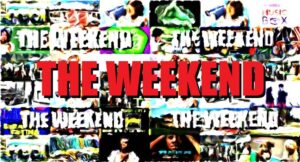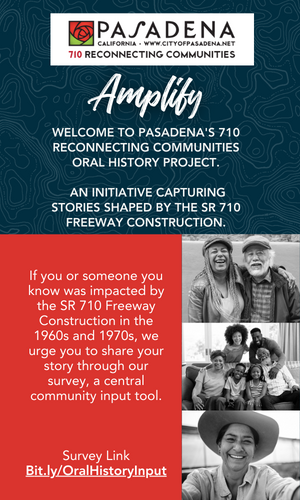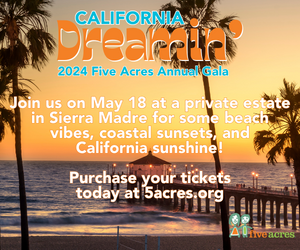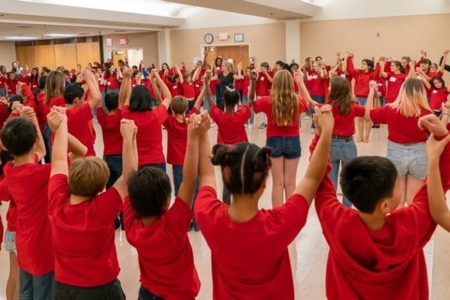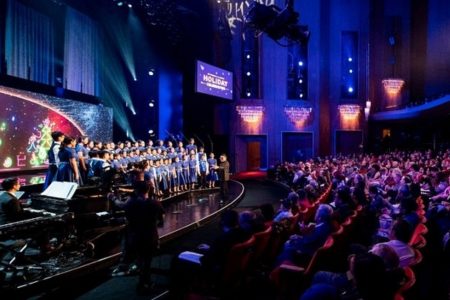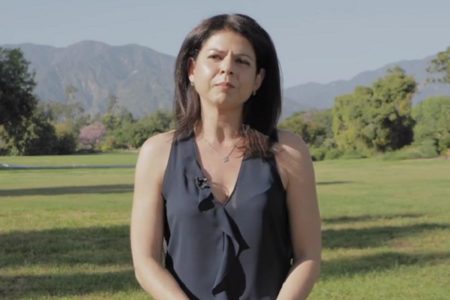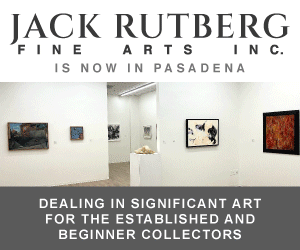
(L-R) LACO Concertmaster Margaret Batjer, special guest pianist Andrew von Oeyen and LACO Principal Cello Andrew Shulman performing together live–socially distanced with no audience–at Zipper Hall for the first digital program of LACO’s inaugural SummerFest./PHOTO CREDIT: LACO/Ben Cadwallader
Before the pandemic, classical music aficionados were able to enjoy the finest in chamber music at Los Angeles Chamber Orchestra performances within the lavish yet intimate confines of the Huntington Library in San Marino. Then LACO joined countless other arts organizations in going dark due to safety restrictions required amid the coronavirus crisis.
Of course, LACO didn’t abandon its audience. The orchestra responded recently by streaming its first-ever Summerfest concerts, a series of five performances curated by Concertmaster Margaret Batjer that were prerecorded and crisply edited to enhance viewing.
They’re still accessible and free to stream on the LACO at Home webpage—a placeholder in audience engagement as the orchestra prepares its virtual 2020-2021 season announcement next month. There’s no cost to view LACO at Home shows, which also include past concerts other than Summerfest. Leading off the series is a concert featuring Batjer and others performing Florence Beatrice Price’s violin and piano composition “The Deserted Garden” and Mendelssohn’s Piano Trio in D Minor.
LACO Executive Director Ben Cadwallader started his position just days before the pandemic lockdown hit. Building on a long career that last saw him guiding the Vermont Symphony Orchestra, he has faced the unexpected problems head-on. Cadwallader recently chatted with Pasadena Now about the challenges and changes.
It must have been a major surprise to see everything change so dramatically in your first week on the job.
I started March 9 and we closed the offices indefinitely six days later. I got here right before the shutdown, so I got to know the organization through the lens of a screen. It’s been bizarre to say the least, but I’m an optimistic guy.
The way I think about this is that if there were at any point in the tenure of someone in a position like mine to face changes, then the best time is at the beginning of a tenure when I didn’t have all the answers and a preconceived idea of how things are supposed to run. It’s a clean slate at a time when everything is up in the air and our entire existence is under threat and we have to evolve completely in an unfamiliar environment. Being without a strong pre-existing vision in place has served me well, if only for my own mental health.
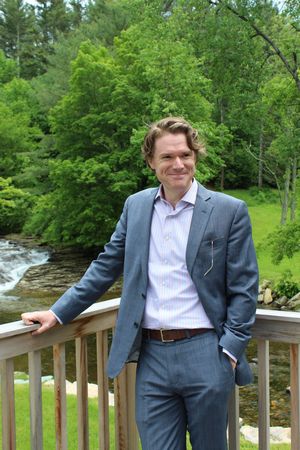
LACO Executive Director Ben Cadwallader./PHOTO CREDIT: Old Mill Road Media
What can you tell us about the upcoming season?
It’s of course going to be a digital season. The shows will look and feel similar in consistency and length to the Summerfest shows, though the scope is much longer since we’re starting in November and filming a brand new show every other Friday for months.
In the very near term, we’re going to post a Summerfest highlight reel, distilling down the staff favorites from the five events. We’ll also do an upcoming-season overview video. The full schedule will be announced at a live event next Thursday for subscribers, walking members through a preview, and then the public announcement should be up in the first week of October.
What’s the philosophy behind LACO At Home’s approach, as opposed to how it presents its live, in-person performances?
We have to think of them as two separate, totally distinct experiences. When you watch a video of a concert, even if the production value is really high, you’re left with the feeling of loss, thinking, “I really wish I could have been there.” You didn’t get the full experience.
So what we want to accomplish with our videos coming up this season, is that we’re creating this content specifically for streaming. It’s not going to be filmed in a conference hall. We’re hiring a director who can make the experience digitally native, so that even if you’re in the room when it happens, you’ll feel the full experience when the broadcast is fully edited as a 30 minute episode. It’s not a replacement of what happens in the concert hall, or a watered-down experience; it’s its own experience in this “digital intermission,” as we’re calling it.
How has going virtual affected the artists?
It has had a tremendous impact in that we’ve had to pivot and essentially become a media company where we’re learning whole new competencies in making and distribution. Making chamber music is such an intimate art, so when you are socially distanced–and that is further exacerbated when wind players due to Covid requirements are behind plexiglass partitions–it brings up some very real and new acoustical challenges for musicians who’ve been performing for decades.
How do you foresee eventually returning to live performances?
The question of when we go back to a concert hall is a good one, and I don’t have an answer yet. The idea that we’re going to snap back to the way things used to be, with hundreds of people in a small space, isn’t going to happen quickly. Going “back to normal” may not happen at all in the way it used to be.
It’s a difficult thing to reckon with. I may be wrong and that would be great, but even once there’s a widespread vaccine it’s tough to imagine a world in which you have hundreds or thousands of high-risk individuals gathered together in confined spaces. It’s a question that keeps me up at night.
Going back to the concert hall is going to happen; the question is when. I don’t think any of us are thinking these digital initiatives will fully replace live in-person concerts. The Huntington is beloved by our audiences in Pasadena, we will be back.
